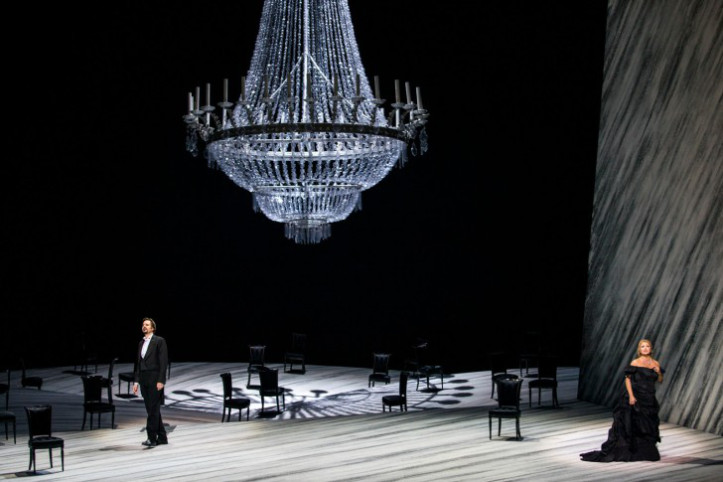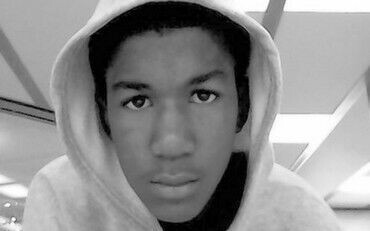
Eugene Onegin is a very engaging opera, which requires two very strong leads. At the Opera de Paris, the other night, we got exactly that, and the result was a fantastic performance. Über-diva Anna Netrebko returns to the role of Tatjana, after her debut only a few years ago, and I have a hard time imagining a singer nowadays better suited to this part. In the first act Tatjana is a very young and naive girl who falls in love with Eugene Onegin, whom she just met, and confesses her love to him in a letter.
 Peter Mattei (Onegin), Anna Netrebko (Tatjana), Pavel Černoch (Lenski) and Varduhi Abrahamyan (Olga)
Peter Mattei (Onegin), Anna Netrebko (Tatjana), Pavel Černoch (Lenski) and Varduhi Abrahamyan (Olga)
Netrebko is around 45 now, so it’s a bit tricky to look like a young naive girl, but she manages splendidly. In the first act, she whitened her voice, making it lighter and more silvery, removing the darker, deeper tones. I am not sure if I agree with this choice: her full voice is absolutely wonderful, and this somewhat artificial whitening does interfere with the delivery – my tweep Rossignol heard some intonation problems in the first act, and I am convinced that these problems are due to this technical “solution”. Her acting is superb: she becomes a young, beautiful, blonde girl (the blonde hair on her is quite disconcerting), in love for the first time, totally overwhelmed. The outburst of passion in the letter scene is worthy of Tosca, even with the teenage voice (when is Tosca coming, Trebs?). When Onegin rejects her, sneering and lecturing, her humiliation is palpable, the scene is amazing.
Of course, that scene is amazing also due to Peter Mattei, singing Onegin, a Swedish singer who I was hearing live for the first time. His voice has a beautiful color, he has a good projection and an incredibly masterful legato. He is not a passionate singer: his voice does not convey the overwhelming outbursts of emotion, and this perfectly fits the character. When he lectures Tatjana about how she should be more careful in opening her heart to people, Mattei’s voice is the perfect embodiment of self-righteousness. His contempt for the country-bumpkin who took a fancy to him is very evident in the somewhat cold quality of his voice.
 Varduhi Abrahamyan (Olga), Elena Zaremba (Madame Larina) and Anna Netrebko (Tatjana)
Varduhi Abrahamyan (Olga), Elena Zaremba (Madame Larina) and Anna Netrebko (Tatjana)
Also during the duel with his friend Lenski, when he ends up killing him, the interpretation is perfect: his detachment and fatalistic cynicism are extremely well communicated by his singing.
In the last act Netrebko fits the character much better: Tatjana is now a sophisticated socialite in St. Petersburg, the wife of a Prince, admired and held in high regard by the aristocracy. Onegin, who’s become a caricature of himself, realizes what a chance he lost, finds himself in love, confesses his love to her, but it’s too late. She is not going to throw away her life for him.
 Monsieur Triquet (Raúl Giménez)
Monsieur Triquet (Raúl Giménez)
Mattei’s voice shows the other side of the coin in the “arioso”, where he realizes he’s in love, and the music picks up the same melody Tatjana was singing during the letter. His voice does not convey the explosion of passion that the moment would require. But in the following duet he is a convincing lover, and his desperation at the end is very moving – and enraging at the same time: what a moron!
Netrebko was absolutely perfect in this whole act: she unleashed her voice, giving us all her bronze deep colors, letting the chest voice mix with her head register, and she was marvelous. The vocal and physical adherence to the character is totally convincing, and her singing was amazing. When they sing together “Happiness was so close… so close”, their voices repeating tak blizko, softer and softer, managed to communicate a desperate longing, it was a very moving moment.
 Peter Mattei (Onegin) and Anna Netrebko (Tatjana)
Peter Mattei (Onegin) and Anna Netrebko (Tatjana)
Lenski was tenor Pavel Černoch, a nice, elegant voice which is just too light for Lenski. He looks the part, he is a good actor, and his delivery is very good, overall, but for my taste Lenski needs a bit more beef in the voice, and a deeper color.
Olga was one of my pets: Varduhi Abrahamyan, and she was great! Her wonderfully dark voice fits very well with Netrebko’s, and her interpretation was committed and convincing. I just love the color of her voice, and I am amazed at how she can switch from Handel to Bellini, from Rossini to Tchaikovsky, without losing a beat. That’s musicianship!
 Anna Netrebko (Tatjana) and Aleksandr Tsymbalyuk (Prince Gremin)
Anna Netrebko (Tatjana) and Aleksandr Tsymbalyuk (Prince Gremin)
Prince Gremin, Tatjana’s husband, has a single aria: the most beautiful of the whole opera. Aleksandr Tsymbalyuk was absolutely great. His bass is deep and confident, and he managed to portray the old prince with a moving interpretation. He is just too young and handsome for the part, they should have made him up to look older, but man, what a voice. I had already heard him in Boris Godunov, and I liked him even better here.
The “minor” characters of Madame Larina (Elena Zaremba), Filipevna (Hanna Schwarz) and Monsieur Triquet (Raúl Giménez) completed an extremely competent cast; I particularly enjoyed Schwarz’ interpretation of the old nurse.
The production was minimalistic, very few things on stage, Tatjana writes her letter using a chair, the floor, the walls as support, because there is no desk. The chorus stays on stage only for the time that is strictly necessary: they come, they sing, they leave, even when the plot would require some people around. As grateful as I am that the director didn’t actually have the chorus singing off-stage (as I have disgracefully seen in Munich, in Un ballo in maschera), I really didn’t get the point. Ah, and the chandelier! There was a GIGANTIC chandelier in the last act, which completely dominated the scene. Quite impressive!
I had already seen Onegin in London a couple of years ago, with Hvorostovsky, and I had a strong emotional reaction to it. This time the whole thing left me a bit cold, and, after talking about it with my tweep Rossignol, I realized why. It’s all Wagner’s fault. I just came out of My First Ring, and it’s too soon. Tchaikovsky’s music, right after Wagner, sounded a bit shallow.
Advertisements Share this:




